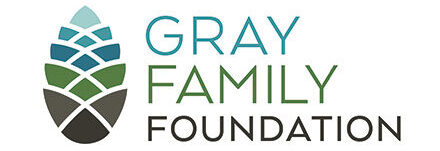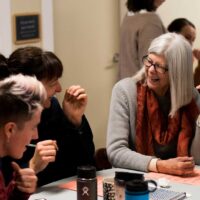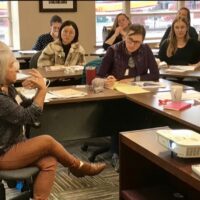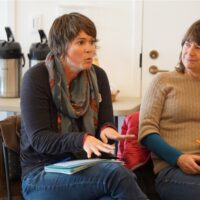Wherever you are in the Northwest, you’re standing on Indigenous lands. It’s a simple fact, but one that runs against two centuries of the dominant narrative that Lewis and Clark “discovered” the lands we now call home.
“That’s our origin story, and that story is tragically oversimplified,” says Colin Fogarty, Executive Director of Confluence.
The West-facing history curriculum is a big ship to turn, but Confluence is helping do just that. Founded in 2002, the organization connects people to the history, ecology and native cultures of the Columbia basin by amplifying Indigenous perspectives. Known for a series of large art installations along the Columbia River, Confluence expanded its education programs in 2007 to bring native artists and storytellers into schools.
In the process, they discovered that it wasn’t just students who needed help understanding Indigenous perspectives, but also teachers who wanted guidance and support. Responding to this need, Confluence utilized funding from the Gray Family Foundation to design a series of day-long teacher workshops led by tribal elders and storytellers.
“The idea is to help teachers connect their students with a broader understanding of the Columbia River system, and doing that by elevating Indigenous voices,” Fogarty says.
To date, nearly 400 teachers have participated in the workshops at locations including Portland, Vancouver, Gresham and The Dalles. That number continues to grow, even as the trainings go virtual due to COVID-19.
To honor each teacher’s unique journey, the workshops create space for personal sharing and examining their own cultural heritage. At one workshop, an educator came to terms with the impact her own ancestors, who were Oregon pioneers, had on suppressing native culture.
“The weight of our history comes out, and it can’t help but be really powerful and painful for some people. But there’s also a lot of laughter, too,” Fogarty says.
Ultimately, the workshops are an entry point for teachers to bring more inclusive education to their students and talk about challenging cultural issues in the classroom. Now in its third year of workshops, Confluence has dovetailed the work to support Oregon Senate Bill 13, which is a 2017 agreement between the state and tribes to ensure native perspectives are a part of the history curriculum across Oregon.
By listening to Indigenous voices, Confluence is helping shed new light on what it means to be an American—in a nation so young, but surrounded by the perspectives of native peoples who have lived here for millennia, and still live here today.
“Because the story that we learned in school so based on manifest destiny, and the whole concept of discovery,” Fogarty says. “We’re trying to replace that story with a story of confluence. It’s a story of people coming together.”



